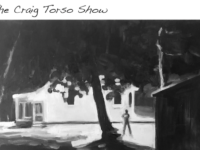What do you get when you cross Captain Beefheart with Sun Ra, Negativland and The Residents? Oh, mercy…
Out of the experimental Leeds, UK scene comes the multi-instrumentalist, multi-dimensional and multi-demented Craig Scott. He’s got more fresh ideas on how to create music for just one record than some avanteers are able to eke out over a career, and he first one War Is A Racket already puts him near the forefront of his chosen, weird little corner of the music world.
Coming to us courtesy Wasp Millionaire Records, Racket on a nominal level might come off as just that: a racket. But the building blocks for these sonic constructions are improvised performances, extemporaneous out-jazz made even unpredictable when Craig Scott dissects the improvs, contorts them analog style and puts them back together digital style rich in vivid detail and countless subtleties. A little bit like the John Oswald treatment, except that he does this to his own music. He gets much help from an orchestra that’s a little unconventional even before homemade tape mangling, enlisting an assortment of woodwinds, a standup bass, piano/keys and drums along with a violin, steel pans, table and wordless vocals. Scott himself adds guitars, electronica and a plethora of odd noises to the mix.
Unlike other cut ‘n’ paste tape terrorists, Craig Scott’s resulting art usually has some sort of a flow to it and a theme that alternately erupts to the surface and gets buried underground. Take a gander at “Tempest In An Teacup” a warped Slavic folk dance music. Underneath the buzzes, whooshes and counter melodies swirling about, there’s an actual song underneath that often pokes up above the clutter. But even when it isn’t, it’s dictating the parameters of the song. That’s a nuance that Scott understands when he’s dicing, splicing and radicalizing these shards of recordings; it’s creating not order per se but chaos with a purpose.
Each song is its own person(ality), as “Proud To Be A Mirkin” might be regarded as a sound collage rather than a song, although brief sax patterns emerge here and there amid a crucible of organic and artificial sounds, and competing grooves. “Gibbles” on the other hand might be the sanest song of the album as the melody is pretty easy to make out, but could nonetheless be best described as Eric Dolphy meets Bob Marley meets Beefheart.
Speaking of Marley, strains of worldbeat find their way into a lot of these tracks: on “Technicolour Yawn” what appears to be West African guitar-like instrument is chopped up and mixed with strings, bent circuitry, atonal clarinets, and start/stop galloping rhythms. “Voodoo Friday” has Afro rhythms, straddling the line between festive and creepy. A Hawaiian guitar and gypsy horns join in and somehow it’s a righteous groove construction. After a while, though, everything becomes just noise except for the twangy bass line.
Even minimalist motifs have a place in Craig Scott’s jumbled world: the title song is sprinkled with spare notes from a piano totally oblivious to the funky, off kilter time keeping. Distorted voices of agony can be heard amidst this dissonant mixture of disparate, barren threads of noise music.
It’s not difficult to make the connection between the endlessly imaginative music presented onWar Is A Racket and a lobotomy; both are mind-altering experiences. At least in the case of Craig Scott’s procedure, there are no nasty side effects.



